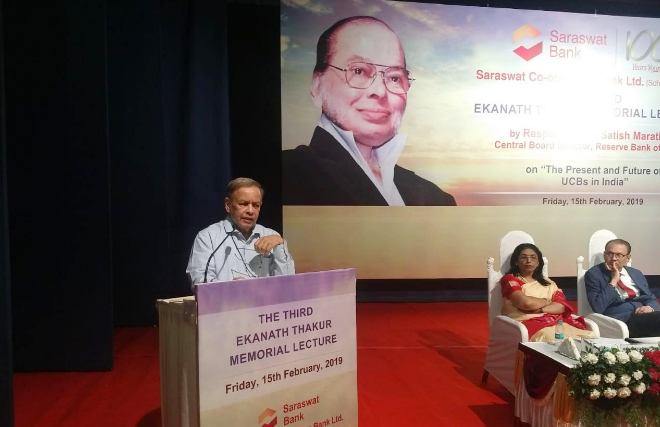The third Ekanath Thakur Memorial Lecture held in Mumbai on Friday not only paid rich tributes to the late Ekanath Thakur but also discussed challenges being faced by the urban cooperative banking sector today. Mentioning his first meeting with the late Thakur at the residence of Balasaheb Thackeray, the key speaker, RBI’s Central Board Director Satish Marathe said” I wish I could have met him more frequently”.
Lauding the late Ekanath as a democrat par excellence Marathe said “my respect for him rose many times when he resigned from a lucrative govt position protesting imposition of emergency in the mid- seventies. ”Ekanathji was a role model not only for UCBs but also for anyone concerned with purity in public life”, Marathe underlined.
The event held in Swatantryaveer Savarkar Sabhagriha, just across Shivaji Park attracted several cooperators connected with urban cooperative banks including Padma awardee Madhu Mangeshkar, among others.
Welcoming the guests Saraswat Bank Chairman Gautam Thakur said his father’s (Late Ekanath Thakur) life mission was to effect a paradigm shift in which he succeeded gloriously. “He wanted to change the perception of cooperatives being perennially small enterprises. He proved by his hard work that cooperative is equal to big not small”.
The young Chairman narrated several incidents from the life of Ekanath Thakur proving his commitment for the sector.” We would joke in the family that Dad belongs more to Saraswat Bank than to Thakurs”, said Gautam drawing huge applause from a packed Savarkar Sabhagriha.
“There are 58 lac SMEs and they contribute 50 per cent of GDP. There is a need not only to finance them but also hand-hold them. A country of 140 crore would be needing to produce much more and together we can have a win-win situation both for SMEs and UCBs”, Marathe stated.
Similarly women self-help groups could be a source of huge business activities, said Marathe. There are 87 lac SHGs in the country which are being managed by just five thousand NGOs. Co-op needs to step in and give them finance and skill igniting numerous economic activities across states. In this connection, Marathe recounted the Sahakar Bharati experiment of floating a few thousand SHGs which have proved very successful so far.
Marathe, in his speech also listed three challenges before the UCB sector and congratulated Saraswat Bank for focusing on one of them well in advance. “ We cannot wish away the risk factor in banking and UCBs need to
Retaining young generation by giving them dignity and independence and adopting latest technology were other two subjects Marathe spoke about at great length. On the strength of data culled from NABARD and RBI sources, Marathe proved beyond doubt how keeping money in UCBs is safer than keeping it elsewhere. “RBI’s data shows that out of 1550 UCBs , more than 1200 are rated A and B. Stranger still is the fact that out of the total of A and B ratings, 87 % has been grabbed by the UCB sector”, Marathe underlined.
Comparing parameters like NPA or CRR of UCB with PSUs, Marathe said despite strong fundamentals RBI yet has a feeling that UCBs need more close monitoring. “I am fighting against this perception and I promise you I will do so in future too”, said Marathe amidst thunderous applause from the audience.
Marathe felt that there is an urgent need to review the Banking Regulation Act 1966 and also a need to review TAFCUB performance constituted 10 years ago. “We need to have a vision document for UCBs, a road map of growth from RBI”, he stated.
Earlier, Saraswat Bank Chairman had explained how its Board members fulfill all the parameters and how despite enjoying a pan-India license for opening branches given by RBI, the largest UCB has failed to get clearance to open even a single branch in the last 3 years.
The third Ekanath Thakur Memorial Lecture ended on a positive note with Saraswat Bank Chairman Gautam Thakur underling that two recent developments- elevation of Satish Marathe to the RBI central board and joining of Shaktikanth Das as Governor- have filled the sector with hope. “On my part I assure you that Saraswat Bank would never ever go the private way”, Junior Thakur reiterated amidst applause.
